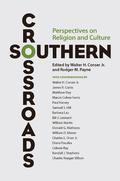The South has always been one of the most distinctive regions of the United States, with its own set of traditions and a turbulent history. Although often associated with cotton, hearty food, and rich dialects, the South is also noted for its strong sense of religion, which has significantly shaped its history. Dramatic political, social, and economic events have often shaped the development of southern religion, making the nuanced dissection of the religious history of the region a difficult undertaking. For instance, segregation and the subsequent civil rights movement profoundly affected churches in the South as they sought to mesh the tenets of their faith with the prevailing culture. Editors Walter H. Conser and Rodger M. Payne and the book's contributors place their work firmly in the trend of modern studies of southern religion that analyze cultural changes to gain a better understanding of religion's place in southern culture now and in the future. Southern Crossroads: Perspectives on Religion and Culture takes a broad, interdisciplinary approach that explores the intersection of religion and various aspects of southern life. The volume is organized into three sections, such as "Religious Aspects of Southern Culture," that deal with a variety of topics, including food, art, literature, violence, ritual, shrines, music, and interactions among religious groups. The authors survey many combinations of religion and culture, with discussions ranging from the effect of Elvis Presley's music on southern spirituality to yard shrines in Miami to the archaeological record of African American slave religion. The book explores the experiences of immigrant religious groups in the South, also dealing with the reactions of native southerners to the groups arriving in the region. The authors discuss the emergence of religious and cultural acceptance, as well as some of the apparent resistance to this development, as they explore the experiences of Buddhist Americans in the


